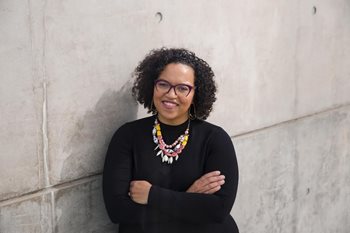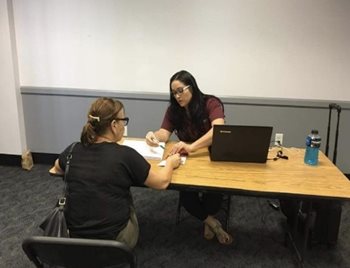A cohort of a dozen NeighborWorks network organizations is assessing the benefits of community health workers. Since September of 2021, the organizations have learned from one another, all while innovating and exploring the way community health workers fit in with their community and their goals.
 What is a community health worker? "In the simplest terms, they're liaisons," explains Romi Hall, NeighborWorks America's director of Healthy Homes and Communities. "Community health workers are intermediaries who find out what residents need, and then support them, tapping into a residents' own motivations to improve health."
What is a community health worker? "In the simplest terms, they're liaisons," explains Romi Hall, NeighborWorks America's director of Healthy Homes and Communities. "Community health workers are intermediaries who find out what residents need, and then support them, tapping into a residents' own motivations to improve health."
Sometimes, that means navigating health care systems. Sometimes, it means helping residents access medication and cleaning materials – even housing remediation. "They help support residents; they help them navigate to where they want to go and be."
Hall says that COVID-19 spurred more network organizations to recognize the importance of the role of community health workers. Organizations that previously hadn't offered supportive services began offering them out of necessity, helping residents arrange everything from vaccines and telehealth visits to accessing food. According to an in-house NeighborWorks survey, more than a dozen new organizations began using community health workers after the pandemic.
An example is Coachella Valley Housing Coalition. Pre-pandemic, the organization brought services to residents that included afterschool programs and help with taxes. When the pandemic hit, and in-person programming had to shutter, they started focusing on health-related ways to connect with families. For low-income families or for older residents who didn't want to go out during COVID, addressing health issues became paramount. "We started setting up some clinics to make it easier for families to check if they had COVID or to get vaccines," says Fabiola Valenzuela, senior resident services coordinator. "We saw this as a way of bringing it to them – health to home. It helps a lot. It saves them time and it's right there in their backyard."
Chicanos Por La Causa in Arizona had more experience with community health workers. They've worked with programs for six years, says Claudia Boyer, adding Keogh Health Connection as its newest program with a mission to connect individuals and families in need of healthcare and community resources. "Community healthcare workers are rare resources," she says. "They find out what is required in a community, what is working, what is not working and why.
worked with programs for six years, says Claudia Boyer, adding Keogh Health Connection as its newest program with a mission to connect individuals and families in need of healthcare and community resources. "Community healthcare workers are rare resources," she says. "They find out what is required in a community, what is working, what is not working and why.
It helps when the workers speak both Spanish and English and are from the community. "They already live in the area, they're already familiar with the community and the church and the school. It's a way for them to connect with the community and find out what kind of programs we're needing to set up. The community health workers are front-line public workers that have unique understanding of the culture and language of the communities they serve."
They've played a vital role in helping families coming out of homelessness, too, Boyer says. In those cases, more one-on-one assistance is required. "We help them with seeking jobs or obtaining food – with getting into the workforce and everything those families need to get into the workforce and be healthy and have their kids be able to show up to school and get their lives back on track.
In 2016, Keough began to identify and train qualified community health workers, (in Spanish, promotoras de salud) to link healthcare providers and patients, identify available social services, and teach healthy living and disease management. The organization is working to get a curriculum approved to help train others in using community health workers.
"NeighborWorks and network organizations make it a point to focus both on the place and the people who live there," shares Hall. Community health workers are a part of that strategy, known in the field as comprehensive community development. And they're part of the strategy to address the overall intersection of health and housing. Boyer calls it a "whole person, whole family approach."
Those in the cohort – some which were already utilizing community health workers, and others who were just getting started – each received $40,000 to $50,0000 to support their programming. NeighborWorks often uses learning cohorts and encourage network organizations to exchange information on everything from savings to communications.
Coming soon: A day in the life of a community health worker.
Read about another health-related NeighborWorks resource: A toolkit to help connect network organizations with health industry partners.
11/17/2022

